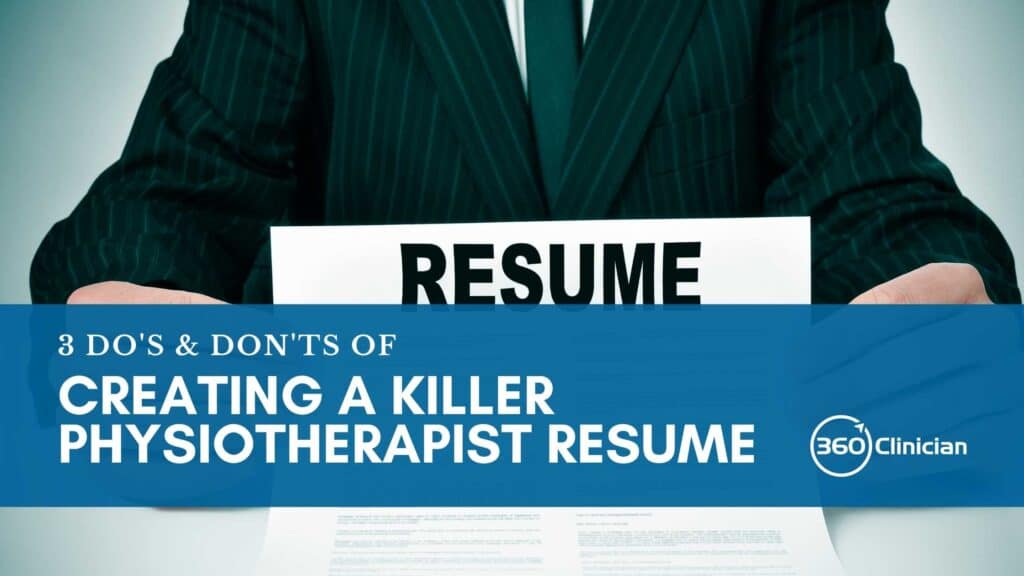So you\’ve bought those perfect shoes that let you be comfortable on your feet all day long and you\’ve found that elusive pair of dress pants that actually allow you to move. Your name tag is in your bag and you\’ve set an alarm for Monday…three hours before you actually have to be on site. You\’ve done everything you can think of to prepare for your first every physio placement, but you still don\’t feel ready. No worries, we\’ve all been there! Here are a few tips to help you survive your first placement.
1. Take your learning plan seriously
I know, I know. Learning plans are so boring. But really, there\’s a reason we make them. My learning plan for my first placement was a road map to what I wanted to accomplish, and it allowed me to make sure I was on track to achieving my goals. If you take it seriously and make your learning plan for the purpose of helping yourself, not just completing a requirement, it can really help give you direction and motivation during your placement.
2. Find your fear of making mistakes… and throw it out
Being afraid of making mistakes is natural, but it will hold you back on placement. Now is the time to practice skills on real patients, and yes, you will mess up, but that\’s how you learn! Being confident doesn\’t mean you think you\’re perfect; it means you have the courage to try skills you need to practice. The best advice I\’ve had from a CI so far was \”fake it til you make it.\” If you\’re not confident now, act like you are, and soon you really will be.
The bottom line is, YOU WILL MAKE MISTAKES. Get over it. Now.
3. Know that you\’re not expected to be entry level
Nothing will kill your confidence more than expecting to have entry level skills during your first placement. Your CI doesn\’t expect this of you, and you shouldn\’t either. Definitely aim to develop your skills as much as you can, but remember that you still have a lot to learn, and that is 100% okay.
If you\’re unsure what is actually expected of you as a beginner physiotherapy student, the UBC website has some excellent information sheets on placement evaluation. I would recommend reading “Rating Scale and Anchor Descriptions.” Trust me, you\’ll feel way less pressure to be perfect after reading it.
4. Remember that your physio labs aren\’t the real world
Be prepared to see skills you\’ve learned in labs done differently by your CIs. Assessments won\’t follow the same order every time, and two patients with the same problem list won\’t necessarily be prescribed the same exercises. Don\’t stress about this! Instead, take the opportunity to learn how your skills can be adapted in the real world.
Also remember that your patients will have very different levels of function than your healthy classmates. If you\’re doing a balance assessment or exercise with a patient, they really might fall over!
5. Remember that you have a valuable perspective to offer too.
Your CI undoubtedly knows more than you do, but it\’s possible that you know something they don\’t! If your CI handled a situation differently than you would have, don\’t be afraid to talk about what you would have done and ask them why they did what they did. Most of the time, you\’ll hear a valuable nugget of clinical experience or they\’ll point out a patient characteristic you didn\’t think about, but sometimes they\’ll learn something from you too. As long as you discuss these differences in an open, professional, collaborative way, you might be surprised how much your CI appreciates hearing about some recent research you heard about in class, how your professor recommended treating a specific injury, or a new special test you learned about in your MSK course.
6. Bring a small notebook
This was a lifesaver for me. I started out with a clipboard full of looseleaf, but I quickly switched to a pocket notebook. It is so much more versatile, and you won\’t lose the pages! I used it for three main purposes:
1. Notes for your future self
- questions to ask your CI at the end of the day
- things you want to look up later (like a condition you saw for the first time or recommendations for treating a particular injury)
- future minor project ideas
- courses your CIs took that you might be interested in taking once you graduate
2. Scribble pad for thinking and planning
- The notebook was really helpful for organizing my thoughts while trying to figure out what a new patient\’s main problems were and what my treatment plan should be, and brainstorming new exercises I would like to try with existing patients.
3. The memory saviour
- I know this isn\’t the case for everyone, but my working memory was TERRIBLE during placement. All the learning during placement is a lot for your brain to take in, and for me, my short term memory suffered for it. I frequently had to ask my CI to repeat the next two things I was supposed to do after completing the first task, and sometimes I sent patients home forgetting to do something my CI had asked me to do with them. Jotting down instructions made me much more efficient and much less stressed!
7. Be prepared
Before your placement, make sure you remember the basics like how to use a goniometer and how to write a chart note. If you can, bring some class notes or your favourite textbook with you so you can look stuff up throughout the day. At the end of each day, try to find out what you\’ll be doing the next day or what type of patients you\’ll be seeing so you can refresh relevant knowledge and identify some skills you\’ll have the chance to practice. Maybe you\’ll even use your notebook to plan what you want to do with a returning patient the next day. Placement goes by so fast! Being prepared helps you make the most of each day and take every opportunity you can get to develop your skills.
8. Reflect regularly and ask for feedback
Don\’t wait until the midterm assessment to reflect on how you\’re doing. Reflect at the end of each week on what you learned, what you want to work on next week, and how you\’re going to do it. Ask yourself: \”Am I on track with my learning plan?\”
If you can swallow your pride, it\’s a great idea to ask your CI if they see an area of weakness that you have and then make a plan together to work on it.
9. Take initiative
Really, this encompasses it all. You will benefit so much more from placement if you take responsibility for your learning by asking questions, preparing for each day, and seeking out hands-on experience. Don\’t be a passive learner. Be an active one. If you want to try something new, ask your CI if they\’ll guide you through it. If you want to see a certain type of condition, ask your CI if they can keep an eye out for it for you. If you don\’t know why or how your CI did something, ask them. If you want to plan a treatment for a patient, ask your CI for a good patient to try it with. If you want to take a subjective history on your own, ask your CI if they feel comfortable stepping back and giving you a shot. The last thing you want your placement to be is a really long job shadow.
10. Have fun & take a nap!
Your first placement can be nerve wracking, but it is such an amazing experience. This is your chance to put your hard work into practice, help people in need, and learn a ton about your future career. You finally get to practice what you want to do for the rest of your life instead of sitting in class talking about it. Enjoy it! It\’s awesome! Take responsibility for your learning, but don\’t overwhelm yourself. You\’ll learn the best if you relax, enjoy the learning experience, and take care of your physical and mental well being. I needed an insane amount of naps during my 6 weeks of placement, and that\’s totally okay! My brain was working overtime and it needed lots of breaks. Like anything in life, you\’ll get back from your first placement what you put into it, so work hard, take care of yourself, and have a blast!
Don\’t sweat it, you\’ll be just fine! Oh, and those dress pants look fantastic. Good luck!

